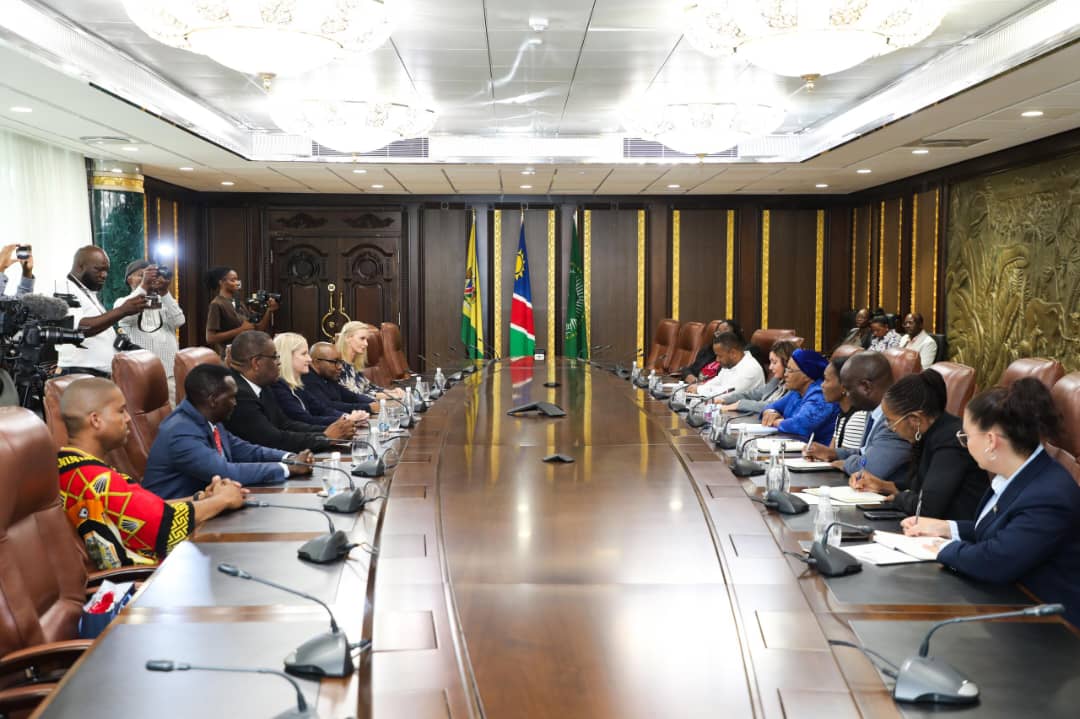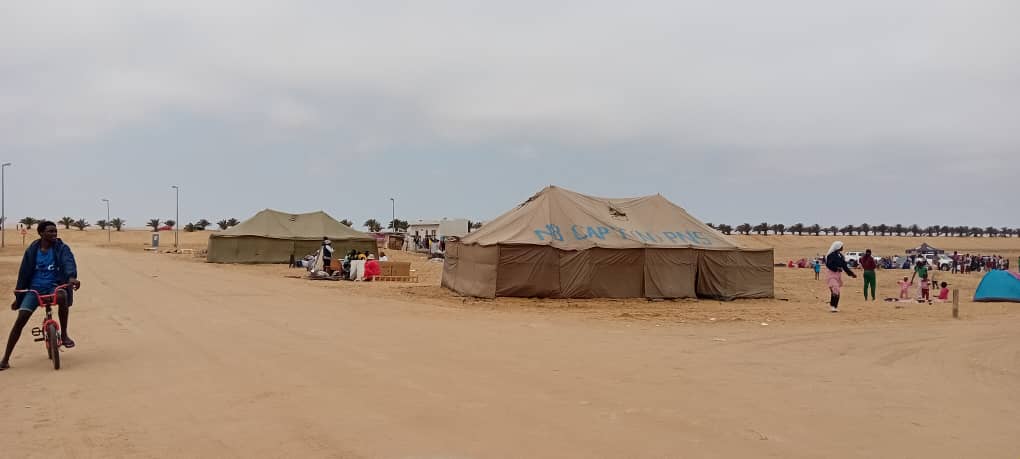THAT uncomfortable relationship between religion and politics returns to the agenda.
You know, the one where it is great when churches give support and elevate “the cause” to a higher level of legitimacy in times of need. Churches were major driving forces in getting Namibia’s independence on the formal international agenda through resistive courage, a record that worldwide is, unfortunately, neither consistent nor unblemished; they do support the wrong side sometimes! But in Namibia’s case they did well and the political elements owe a considerable debt.Now that the “struggle” is over, apartheid has gone and the new order is entrenched, political elements realise a rising tide of criticism is flowing and is being pumped by the engine of religion fuelled by social/ethical conscience, glued together by faith! God, all versions, has a good track record of survival under duress; in a world of increasing unfairness and division, whatever theocratic mantra dominates, religion and other fundamental beliefs are gaining support.Credibility of politicians, in almost all countries, is nose-diving; the counter is the power of civil societies, especially those of the poor, is flying higher.This is especially significant in poor and ostensibly democratic countries as continued political power through the ballot box is in the hands of the poor thus shifts represent a threat to the status quo of privilege.The churches, once a source of “the high ground” and legitimacy now represent a threat as they increasingly assert moral and ethical dissent.Our Founding President realised this and made forceful comment on the rising breed of (new) evangelical churches in Namibia; he well realised the power of religion and the debt to the “old churches”.However the trend continues; mass togetherness and community of the evangelicals together with considerable wealth, generated internally and externally, is a growing force.Deprivation due to price rises is exacerbating matters as the poor realise that, despite having put their faith in politicians, they cannot deliver and their plight just gets worse.Their allegiances are likely to shift towards the spiritual; congregations (and other civil society groupings) that have power and are beginning to exert it.On the other hand religion has also entered a rocky road as it forsakes God for mammon; recent criticism of the “world preacher class” buying private jets and excessive lifestyles indicates there are black sheep in the flock.Locally several cases of the “very religious” being caught with their hands in the till big-time, have emerged! Hypocrisy flavoured with violent intent is also far from new as is the intent to monopolise the truth by imposing ignorance upon their flock.Ignatius Loyola and his Jesuits were not exactly angels of love; their mission was to inspire conformity to Catholic church beliefs by burning books, wiping out those with disparate views and generally putting the fear of (their) god into the population.Their later exploits in converting heretics, those with different views, especially Protestants, showed they were remarkably creative in the arts of torture and painful death; public demonstrations of their cruel skills cowed opposition in the short term.In the long term they failed to stem the groundswell of original thought, innovation and new institutions.Other groups had their own stylish methods which were no less cruel and inhuman and, in the longer term, equally ineffective; cliff throwing, disembowelling and public burnings come to mind! Here there is coincidence between political and religious activity that comes to life when their power is threatened.Firstly they use the more subtle weapons; politicians can promise the earth, patronage, money and fringe benefits for the conformers, the religion of the ATM; the religions can offer non-earthly benefits, immortality, life-after-death and salvation from eternal hell-fire! But when the going gets tough and the people begin to ask difficult questions out come the clubs, riot gear and guns; they use the instruments they created to uphold their law to break that same law! The evidence is self-evident! This apparent inevitability lead to the growth of democracy in many forms and degrees of effectiveness as people got tired of persecution.Over time and in various democratic forms, it emerged to give rights of protection, freedom of thought and choice.Democracy also provided a way for religions and politics to, more or less, peacefully co-exist through a process of law.Politics and religion were separated while accepting they need each other to survive; a delicate dance where toes are often trodden on.The basic principle was that political and religious leaders, be they queens, presidents, archbishops or whatever, did not hold the right to dispense arbitrary justice but were subject to the principles and practice of law; laws made by an agreed authority.A recipe that, while not perfect, seems to underpin nations that have become “successful” and stable.Kings no longer have the power of Divine Right and through this the right to treat their kingdom as a personal playground! So it was quite interesting to note that a regional leader seems intent on restoring the power of Divine Right; probably in a similar phase of his rule of his predecessor who said “never in a thousand years”.It was also interesting that one of Namibia’s more youthful politicos is reportedly recommending this separation be negated by having a “Ministry Of Religions Of Namibia” (Moron).Visions of denomination desks, desks for transubstantiation, virgin birth and reincarnation, a religious electoral commission, praying licences and a levy on donations loomed; and lots of jobs.However I fear the spiritual society would be literally “up in arms”.As a devout atheist (failed Anglican), with principles (?), I see stormy waters ahead but maybe the seas will part and allow this idea to flee to oblivion! Freedom of opinion is the basis of stability; despotism has been a proven basis for failure.Intellectual police? Morons? As Cameron, a UK Conservative said at his parliamentary baptism of fire, addressing Blair, “he was the future; once”.Churches were major driving forces in getting Namibia’s independence on the formal international agenda through resistive courage, a record that worldwide is, unfortunately, neither consistent nor unblemished; they do support the wrong side sometimes! But in Namibia’s case they did well and the political elements owe a considerable debt.Now that the “struggle” is over, apartheid has gone and the new order is entrenched, political elements realise a rising tide of criticism is flowing and is being pumped by the engine of religion fuelled by social/ethical conscience, glued together by faith! God, all versions, has a good track record of survival under duress; in a world of increasing unfairness and division, whatever theocratic mantra dominates, religion and other fundamental beliefs are gaining support. Credibility of politicians, in almost all countries, is nose-diving; the counter is the power of civil societies, especially those of the poor, is flying higher.This is especially significant in poor and ostensibly democratic countries as continued political power through the ballot box is in the hands of the poor thus shifts represent a threat to the status quo of privilege.The churches, once a source of “the high ground” and legitimacy now represent a threat as they increasingly assert moral and ethical dissent. Our Founding President realised this and made forceful comment on the rising breed of (new) evangelical churches in Namibia; he well realised the power of religion and the debt to the “old churches”.However the trend continues; mass togetherness and community of the evangelicals together with considerable wealth, generated internally and externally, is a growing force. Deprivation due to price rises is exacerbating matters as the poor realise that, despite having put their faith in politicians, they cannot deliver and their plight just gets worse.Their allegiances are likely to shift towards the spiritual; congregations (and other civil society groupings) that have power and are beginning to exert it.On the other hand religion has also entered a rocky road as it forsakes God for mammon; recent criticism of the “world preacher class” buying private jets and excessive lifestyles indicates there are black sheep in the flock.Locally several cases of the “very religious” being caught with their hands in the till big-time, have emerged! Hypocrisy flavoured with violent intent is also far from new as is the intent to monopolise the truth by imposing ignorance upon their flock.Ignatius Loyola and his Jesuits were not exactly angels of love; their mission was to inspire conformity to Catholic church beliefs by burning books, wiping out those with disparate views and generally putting the fear of (their) god into the population.Their later exploits in converting heretics, those with different views, especially Protestants, showed they were remarkably creative in the arts of torture and painful death; public demonstrations of their cruel skills cowed opposition in the short term.In the long term they failed to stem the groundswell of original thought, innovation and new institutions.Other groups had their own stylish methods which were no less cruel and inhuman and, in the longer term, equally ineffective; cliff throwing, disembowelling and public burnings come to mind! Here there is coincidence between political and religious activity that comes to life when their power is threatened.Firstly they use the more subtle weapons; politicians can promise the earth, patronage, money and fringe benefits for the conformers, the religion of the ATM; the religions can offer non-earthly benefits, immortality, life-after-death and salvation from eternal hell-fire! But when the going gets tough and the people begin to ask difficult questions out come the clubs, riot gear and guns; they use the instruments they created to uphold their law to break that same law! The evidence is self-evident! This apparent inevitability lead to the growth of democracy in many forms and degrees of effectiveness as people got tired of persecution.Over time and in various democratic forms, it emerged to give rights of protection, freedom of thought and choice.Democracy also provided a way for religions and politics to, more or less, peacefully co-exist through a process of law.Politics and religion were separated while accepting they need each other to survive; a delicate dance where toes are often trodden on. The basic principle was that political and religious leaders, be they queens, presidents, archbishops or whatever, did not hold the right to dispense arbitrary justice but were subject to the principles and practice of law; laws made by an agreed authority.A recipe that, while not perfect, seems to underpin nations that have become “successful” and stable.Kings no longer have the power of Divine Right and through this the right to treat their kingdom as a personal playground! So it was quite interesting to note that a regional leader seems intent on restoring the power of Divine Right; probably in a similar phase of his rule of his predecessor who said “never in a thousand years”.It was also interesting that one of Namibia’s more youthful politicos is reportedly recommending this separation be negated by having a “Ministry Of Religions Of Namibia” (Moron).Visions of denomination desks, desks for transubstantiation, virgin birth and reincarnation, a religious electoral commission, praying licences and a levy on donations loomed; and lots of jobs.However I fear the spiritual society would be literally “up in arms”.As a devout atheist (failed Anglican), with principles (?), I see stormy waters ahead but maybe the seas will part and allow this idea to flee to oblivion! Freedom of opinion is the basis of stability; despotism has been a proven basis for failure.Intellectual police? Morons? As Cameron, a UK Conservative said at his parliamentary baptism of fire, addressing Blair, “he was the future; once”.
Stay informed with The Namibian – your source for credible journalism. Get in-depth reporting and opinions for
only N$85 a month. Invest in journalism, invest in democracy –
Subscribe Now!










